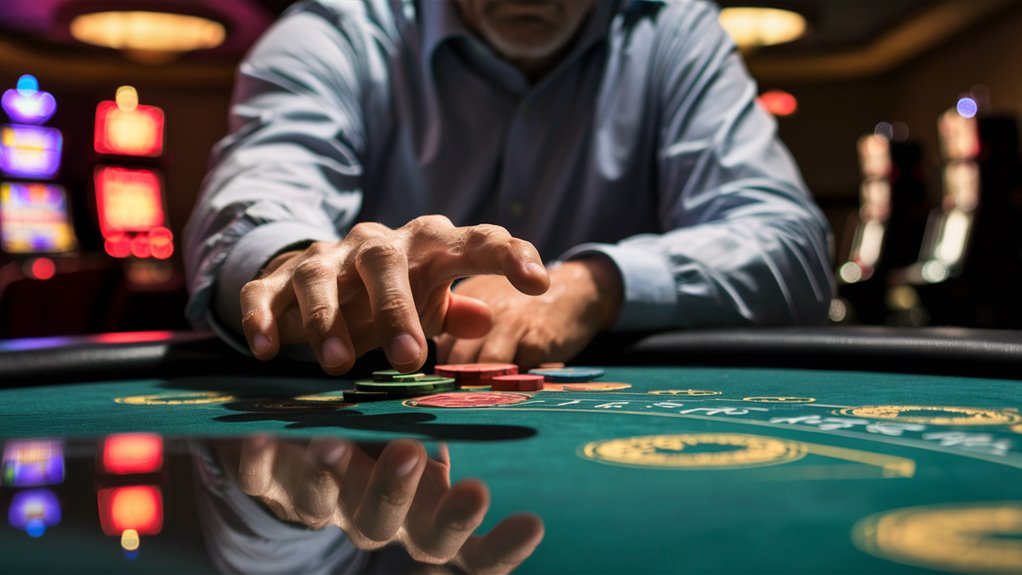
The Mind Side of Gambling Hook

The gambling hook grows deep as the brain’s joy zone gets taken over. When folks bet, their brains release too much of a joy chemical that goes beyond what other fun activities produce. The brain’s liking for unsure wins fires up key nerve links, creating strong drive paths.
Brain Changes
The brain changes significantly from frequent betting. This lessens enjoyment in everyday activities but heightens alertness to betting-related stimuli. The paths for joy increasingly rely on betting to feel excitement.
Stuff and Acts That Lead to Betting
Casinos are designed to hook people. The buzz sounds of slots, bright lights, and lively noise trigger set habits in those susceptible. Combined with poor choice skills and chasing losses, individuals become deeply ingrained in betting loops.
Breaking Free
Understanding brain and behavior connections reveal intervention points for assistance. Tested methods targeting brain and learned behaviors provide effective ways to escape betting hooks. Through cognitive and behavioral shifts, individuals can repair their brain’s joy responses and decision-making actions.
The Brain Joy Zone and Betting Hooks
Understanding the Brain Hit from Betting
Betting hooks disrupt the brain’s usual joy wiring in complex neural pathways. Dopamine, crucial for joy and rewards, is released in greater quantities during betting.
The Hit from Unsure Wins
The primary factor in betting’s brain impact is its unsure win setup. Unexpected wins result in larger dopamine releases, causing the persistence of betting even amid significant losses.
Nerve Links Change
- Less joy from normal activities
- Heightened alertness to betting stimuli
- Increased dopamine release during betting
- Powerful environmental triggers
The brain’s joy zone increasingly relies on betting hits, with former betters’ neurons responding to betting cues such as casino ads and game sounds.
Risk and Choosing in Problem Betting: Nerve Links and Act Hit
Changed Brain Joy Systems and Risk Calls
The altered brain joy system affects risk perception and decision-making in gambling problems. Studies show problem gamblers exhibit poor risk assessment skills with greater allure for perceived wins.
Mind Mess-ups and Chasing Losses
Misinterpreted near wins represent significant cognitive errors in problem gambling. The brain perceives them favorably, sustaining gambling behavior. This compounds with chasing-loss actions, where gamblers increase bets to recoup losses – a difficult cycle to break.
Mind and Nerve Changes
- Heightened vulnerability to gambling cues
- Reduced cognitive control
- Quick reactions to gambling opportunities
- Persistent risk-taking, despite adverse outcomes
These neurological changes alter decision pathways, explaining continued gambling even during financial loss.
Stuff and People Around in Problem Betting
What You Feel and Hear in Betting Spots
Casinos employ powerful sensory triggers to encourage betting. Bright lights, victory sounds, and machine melodies create an immersive experience and 먹튀검증 순위 anticipation for wins. These cues deeply embed into neural pathways leading to potent cravings long after exposure.
How People Around Push Betting
Social cues significantly influence gambling issues. Friends, workplace betting, and gambling family members normalize high gambling behavior.
Places and Times That Push Betting
- ATMs
- Sports venues and bars
- Streets near gaming establishments
- Online gambling sites
Even subtle hints can trigger the “cue wave,” including:
- The sound of coins or chips
- Specific times of day
- Mood states
- Financial transactions
These cues result in powerful pathways that lead to strong gambling urges in susceptible individuals.
The Mind Side of Betting as a Way Out

Understanding Betting’s Pull Away
Mental and emotional cues drive many to use gambling as an escape. Gambling serves as a mental refuge, allowing individuals to detach from difficult emotions and life challenges.
The Bad Loop of Feeling-Betting
The connection between emotional escape and gambling creates a detrimental self-reinforcing loop. Problem gamblers often turn to gambling during distress, but gambling losses exacerbate their psychological issues, perpetuating the cycle.
Getting Away from the Feeling Hideout Loop
Effective interventions must address the underlying psychological needs driving gambling behavior. Standard addiction treatments fall short if they overlook emotional aspects. Comprehensive recovery plans incorporate strategies to build positive mental habits and emotional regulation.
Breaking Free: Getting Past Betting Hook
Tested Help Ways
Overcoming betting hooks requires a comprehensive approach rooted in evidence-based care pathways. Cognitive Behavioral Therapy (CBT) plays a pivotal role by helping individuals identify triggers, alter maladaptive thought patterns, and develop healthy coping mechanisms for lasting recovery.
Money Watch and Control Steps
Implementing stringent financial safeguards is crucial for recovery success. Key protective measures include:
- Utilizing gambling-blocking tools
- Relinquishing control of finances
- Designating a trusted financial overseer
- Establishing automatic bill payments
- Creating spending limits and accountability systems
Building Help Links
- Attending regular Gamblers Anonymous meetings
- Engaging with certified addiction professionals
- Incorporating family into recovery plans
- Participating in peer support groups and mentoring programs
- Engaging in professional therapy sessions
Dealing with Other Mind Needs
- Treating depression
- Support for anxiety
- Addressing other addictions
- Stress reduction techniques
- Trauma therapy if necessary
Life Fixing
- Finding healthy alternative activities
- Repairing damaged relationships
- Establishing structured daily routines
- Implementing stress-reduction strategies
- Setting clear boundaries and triggers
- Maintaining a strict no-relapse plan
Tested Help and Get-Better Paths for Betting Hook
Pro Help Ways
Cognitive Behavioral Therapy (CBT) is a cornerstone for overcoming gambling hooks. CBT interventions focus on:
- Identifying gambling triggers and high-risk situations
- Developing robust coping mechanisms
- Correcting cognitive distortions related to gambling outcomes
- Enhancing money management skills
Help with Medicine
- Naltrexone to reduce gambling cravings
- Antidepressants for mood disorders
- Anti-anxiety medications for stress
- Mood stabilizers for impulse control
Group Help Get-Better Plans
- Gamblers Anonymous meetings and 12-step programs
- Online support communities
- Family therapy sessions
- Featherwired Casino
- Recovery coaching programs
Joined Care Plans
- Professional therapy sessions
- Prescribed medication when appropriate
- Regular support group participation
- Lifestyle changes
- Financial education
- Continuous relapse prevention planning
Individuals who engage in multiple treatment avenues simultaneously achieve higher recovery rates and maintain longer periods of abstinence from gambling problems.
Stop Plans for Betting Hook: Tested Ways
Wide Teach: The Base of Stop
Early education is vital in preventing gambling hooks. Youth intervention programs are most effective when incorporating probability knowledge and risk assessment skills.
Early Signs and Help Moves
- Increased gambling frequency
- Attempts to recover losses
- Deception about gambling activities
- Financial difficulties
Better Stop Moves with Tech
- Site blocking software
- Set limits on gambling-related transactions
- Mandatory cooling-off periods
- Advertising restrictions
Money Watch Helps
- Expenditure limits
- Financial monitoring
- Gambling-related transaction blocks
- Alerts for financial activities
These prevention strategies collectively form a comprehensive defense against gambling problems while promoting safe gaming practices.